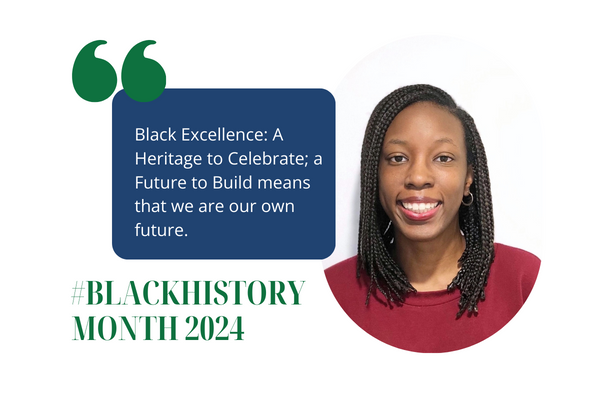
In 2023, the One Vision One Voice (OVOV) program launched a Youth Action Committee (YAC) for young people between the ages of 15-29 to come together quarterly to inform, participate in, and contribute to the work of OVOV.
This year’s Black History Month theme is Black Excellence: A Heritage to Celebrate; a Future to Build. Earlier this month we shared some of the key achievements of the OVOV program over the last year, as well as some of the exciting work ahead. To speak further into the “future to build,” we are introducing one of the co-chairs of the OVOV YAC—Yemi (Christiana) Oladehinde. Please join us in getting to know Yemi and how she hopes to impact the OVOV program and the lives of Black children, youth, and families in Ontario.
Yemi, tell us a little bit about yourself.
My name is Yemi (Christiana) and I strive to be an active member in my community. I studied at the University of Toronto receiving an Honours Bachelor of Science in Psychology and Visual Studies. In the last 5 years, I had the invaluable opportunity to work with both public and private sectors prioritizing Black youth and families. It has been my passion through lived experience to provide Black youth and young adults with a sense of self, belonging, and community.
I strongly believe my consistent passion for this work drives positive impact and distinctive advocacy for the needs of Black children, youth, and families. I encourage preventative approaches where possible. I always try to build environments that encourage diverse and unique perspectives, and I am keen to learn new things through lived experience and research.
What motivated you to join the OVOV Youth Action Committee?
I joined this youth action committee to impact Black youth, children, and families. I’m aware of the anti-Black racism and discrimination weaved through the system for Black families and the disproportionate statistics that follow. I wanted to learn about the lived experiences of those that are involved—the individuals and stories behind the numbers.
Participating in this committee was an opportunity to contribute through any one of the avenues: research or data collection, community consultations, event planning and development, and workshop facilitation. Ultimately, my goal is to improve the mental wellness and well-being of Black Canadians.
Ubuntu: I am because we are.
What issues are most important to you when it comes to addressing anti-Black racism in child welfare?
The issues most important to me when addressing anti-Black racism in child welfare are providing spaces for the visibility of untold stories. Oftentimes, we are focused on the organizational goals or the individuals who are far removed from the actual systems at play. I believe we need to inform more of our decisions with the perspectives of the people it intends to serve. When we are discussing challenges that impact youth, we should be giving youth platforms to speak on the challenges they experience. If that means additional staff or frontline training or program planning, I believe it is a necessary step. How do we provide Black families with safety and reduce stigma? We take the time to learn about their culture, practices, and values, we educate and decolonize our mindsets, and we create culturally informed spaces to connect and discuss issues that are impacting families.
Fundamentally, to address anti-Black racism in the child welfare system, we need to invest in humanizing our community and understanding each other collectively — not simply a Black effort, but a human effort.
What does Black History Month mean to you?
Black History Month has become a performative initiative for many non-Black and even some Black individuals. I am Black all year round, so if you’re going to support Black individuals/organizations and talk about the history of Black Canadians, this should be embedded into your program development and/or marketing campaign, all year round. When Black employees and individuals are suffering from burnout and mental distress due to Black History Month planning, we’ve missed the mark. Black History Month should be a month of rest and celebration for Black Canadians. The history told should uplift and encourage our communities, rather than constantly talking about the trauma and oppression of African and Caribbean peoples. Enslavement continues in the mind when we are constantly reminded of it. History should inform us of the power and strength we can us to create change and positive impact in our communities. All this to say, February is another month for me that may have a more Black-focused events than other months.
Black Excellence: A Heritage to Celebrate; a Future to Build means that we are our own future.